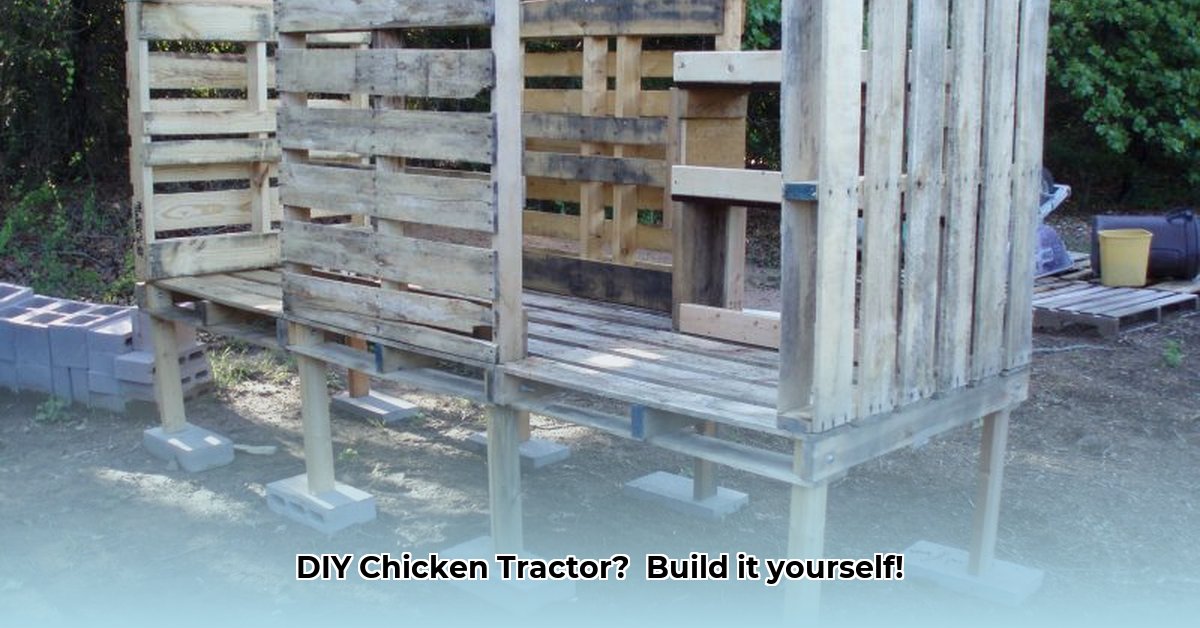
Building your own chicken coop is a rewarding project, offering a budget-friendly and sustainable way to raise chickens. This guide explores two popular options: chicken tractors and pallet coops, outlining their construction, pros, cons, and helping you choose the best fit for your needs. For a combined approach, check out this pallet chicken tractor plan.
Chicken Tractors: Mobile Homes for Happy Hens
A chicken tractor is a movable coop designed for rotational grazing—moving the coop regularly allows chickens to graze fresh pasture daily. This benefits both chickens and your land: chickens get fresh forage, and their droppings naturally fertilize the soil.
What You'll Need:
- Pressure-treated lumber (for durability; consider redwood or cedar for chemical-free options).
- Heavy-duty wire mesh (to exclude predators like raccoons and foxes).
- Strong hinges (for easy coop access).
- Wheels or skids (for mobility; options range from old shopping carts to simple wooden planks).
Construction Steps:
- Frame Construction: Build a sturdy rectangular frame from the lumber, ensuring it's strong enough to support your chickens and withstand movement.
- Wire Mesh Enclosure: Attach the wire mesh to the sides and back, leaving the front open for grazing. Secure the mesh tightly to prevent escapes.
- Door Installation: Hang a door using hinges for easy access to clean, feed, and water your chickens.
- Mobility System: Attach wheels or skids for easy relocation. Wheels are better for longer distances, while skids suffice for shorter moves.
- Interior Amenities: Add roosting bars (simple branches work well) and, optionally, a nesting box.
Pros and Cons of Chicken Tractors:
| Pros | Cons |
|---|---|
| Excellent soil enrichment | Higher material costs |
| Effective pest control | More time-consuming to build |
| Simple relocation | Requires regular maintenance |
| Superior predator protection | May need additional fencing for large areas |
Pallet Coops: Upcycling for Budget-Conscious Chicken Keepers
Pallet coops utilize repurposed pallets, offering a cost-effective and eco-friendly alternative. Crucially, ensure your pallets are heat-treated (HT)—look for an HT stamp. Non-HT pallets may contain harmful chemicals.
Materials:
- HT-treated pallets (inspect for damage; discard anything weak or rotten).
- Wire mesh (for predator protection).
- Screws or nails (for secure assembly).
- Optional: Roofing material (for weather protection), hinges.
Construction Steps:
- Thorough Cleaning: Clean the pallets, removing loose nails, dirt, and debris.
- Coop Assembly: Attach pallets using screws or nails to form the walls and roof. Adapt the design to your space and preferences.
- Wire Mesh Integration: Add wire mesh to the sides and front, leaving a small access point for your chickens.
- Roofing: Secure the roof using existing pallets or weatherproof materials.
- Chicken Amenities: Add roosting bars and nesting boxes.
Pros and Cons of Pallet Coops:
| Pros | Cons |
|---|---|
| Very low cost | Durability varies depending on pallet quality |
| Easy to construct | Potential chemical concerns (if non-HT pallets used) |
| Highly adaptable to various designs | May require more frequent repairs |
Chicken Tractor vs. Pallet Coop: A Quick Comparison
| Feature | Chicken Tractor | Pallet Coop |
|---|---|---|
| Cost | Higher | Lower |
| Mobility | High | Low to None |
| Soil Enrichment | Excellent | Moderate |
| Durability | Generally Higher | Varies greatly depending on pallet quality |
| Ease of Building | More challenging | Easier |
Risk Mitigation Strategies
Regardless of your choice, prioritize safety. Secure the coop to prevent escapes and predator access. Regularly inspect for damage. Maintain good coop hygiene to prevent diseases. For pallet coops, verify HT treatment to minimize chemical risks.
Conclusion: Choosing the Right Coop for Your Flock
Both chicken tractors and pallet coops offer sustainable and rewarding options. Consider your budget, DIY skills, available land, and climate when making your choice. Thorough planning will lead to successful and sustainable chicken keeping.
Resources
While specific suppliers vary by region, searching online for "pressure-treated lumber," "hardware cloth," and "HT-treated pallets" will yield numerous local options. Further information on chicken care and coop construction can be found through online resources and agricultural extension services.